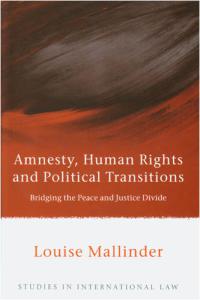Amnesty, Human Rights and Political Transitions: Bridging the Peace and Justice Divide [blackatk]seeders: 3
leechers: 0
Amnesty, Human Rights and Political Transitions: Bridging the Peace and Justice Divide [blackatk] (Size: 3.74 MB)
Description Publication Date: August 28, 2008 | ISBN-10: 1841137715 | ISBN-13: 978-1841137711 | filetype: pdf Amnesty laws are political tools used since ancient times by states wishing to quell dissent, introduce reforms, or achieve peaceful relationships with their enemies. In recent years, they have become contentious due to a perception that they violate international law, particularly the rights of victims, and contribute to further violence. This view is disputed by political negotiators who often argue that amnesty is a necessary price to pay in order to achieve a stable, peaceful, and equitable system of government. This book investigates whether an amnesty necessarily entails a violation of a state's international obligations, or whether an amnesty, accompanied by alternative justice mechanisms, can in fact contribute positively to both peace and justice. This study originated by constructing an extensive Amnesty Law Database that contains information on 506 amnesty processes in 130 countries introduced since the Second World War. The database and chapter structure were designed to correspond with the key aspects of an amnesty — why it was introduced, who benefited from its protection, which crimes it covered, and whether it was conditional. In assessing conditional amnesties, related transitional justice processes such as selective prosecutions, truth commissions, community-based justice mechanisms, lustration, and reparations programs were considered. Subsequently, the jurisprudence relating to amnesty from national courts, international tribunals, and courts in third states was addressed. Overall, amnesties have increased in popularity since the 1990s. Consequently, rather than trying to dissuade states from using this tool of transitional justice, this book argues that international actors should instead work to limit the more negative forms of amnesty by encouraging states to make them conditional and to introduce complementary programs to repair the harm and prevent a repetition of the crimes. Hardcover: 586 pages Publisher: Hart Publishing (August 28, 2008) Language: English ISBN-10: 1841137715 ISBN-13: 978-1841137711 filetype: pdf http://www.amazon.com/Amnesty-Human-Rights-Political-Transitions/dp/1841137715/ Tags: Tags: security studies, conflict studies, war, vnsa, coup, insurgency, crime, terrorism, organized crime, mafia, FARC, Hezbollah, Hamas, PLO, mafia, international, law, legality, amnesty, Sharing Widget |
All Comments